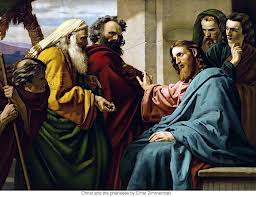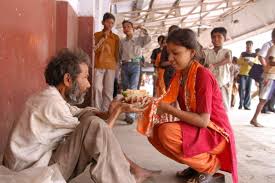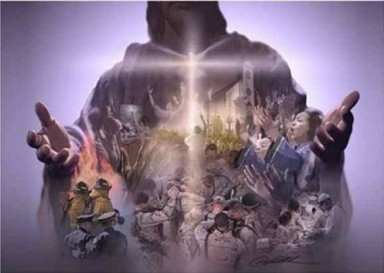
– 09-06-2024 –
Tenth Sunday in Ordinary time
Gospel reading: Mark 3:20-35
vs.20 Jesus went home with his disciples, and such a crowd collected that they could not even have a meal.
vs.21 When his relatives heard of this, they set out to take charge of him, convinced he was out of his mind.
vs.22 The scribes who had come down from Jerusalem were saying,
“Beelzebul is in him” and, “It is through the prince of devils that he casts devils out.
vs.23 So he called them to him and spoke to them in parables,
“How can Satan cast out Satan?”
vs.24 If a kingdom is divided against itself, that kingdom cannot last.
vs.25 And if a household is divided against itself, that household can never stand.
vs.26 Now if Satan has rebelled against himself and is divided, he cannot stand either – it is the end of him.
vs.27 But no one can make his way into a strong man’s house and burgle his property unless he has tied up the strong man first. Only then can he burgle his house.
vs.28 I tell you solemnly, all men’s sins will be forgiven, and all their blasphemies;
vs.29 but let anyone blaspheme against the Holy Spirit and he will never have forgiveness; he is guilty of an eternal sin.”
vs.30 This was because they were saying, “An unclean spirit is in him.”
vs.31
His mother and brothers now arrived and, standing outside, sent in a message asking for him.
vs.32 A crowd was sitting round him at the time the message was passed to him,
“Your mother and brothers and sisters are outside asking for you.”
vs.33 He replied, “Who are my mother and my brothers?”
vs.34 And looking round at those sitting in a circle about him, he said,
“Here are my mother and my brothers.
vs.35 Anyone who does the will of God, that person is my brother and sister and mother.”
*******************************************************************
This week we have three commentators available from whom you may wish to choose . Two are in English and one in Irish.
Michel DeVerteuil : Holy Ghost Father, late director of the Centre of Biblical renewal in Trinidad W.I.
Donal Neary SJ: Editor of The Sacred Heart Messenger and National Director of The Apostlship of Prayer.
agus Pádraig Ó Rúairí, cp, Sliabh Argus, Átha Cliath.
****************************************
Michel DeVerteuil
Lectio Divina with the Sunday Gospels
www.columba.ie
General Comments
We can divide this passage into three sections:
Verses 20 and 21: The attitude of Jesus’ relatives. They are typical of people who because of their status think that they can take charge of Jesus but in fact do not understand him at all.
Verses 22 to 30: Confrontation between Jesus and the Scribes. In verse 22 the Scribes are just as presumptuous and just as wrong-headed as the relatives. In verses 23 to 25 Jesus responds to the Scribes with the kind of common-sense that comes from simple and single-minded people.
In verses 26 and 27 we read a dramatic parable, evoking the harsh struggle between good and evil and how goodness must conquer evil at its very roots.
Verses 28 to 30 are different. Do not approach them rationally, but on the feeling level. Experience the discouragement of Jesus as he confronts people who use religious language to excuse evil
Verses 31 to 35: a second story of Jesus and his relatives. A dramatic meeting between Jesus and his relatives; they are totally out of his sphere and he has understood this and accepted it.
Prayer Reflection
Lord, we thank you for the great followers of Jesus we have known: Mother Teresa and Archbishop Romero; also people we have known personally in our own countries, who have taken great risks and found themselves surrounded by the needy while wise and powerful people were convinced that they were out of their minds and wanted to take charge of them. This always happens when Jesus comes into the world.
Lord, we pray for your church, that we may always be humble.
Do not let us become like the relatives of Jesus, presuming that because we are practicing Catholics we know what is your mind,
or like the Scribes coming down from Jerusalem, thinking that knowledge of our faith enables us to judge who is doing the work of the devil.
 Lord, one of the terrible sins in our day is that when people work for justice we label them communists and atheists; causes close to your heart such as putting the poor first terrify us. What hope is there for us then?
Lord, one of the terrible sins in our day is that when people work for justice we label them communists and atheists; causes close to your heart such as putting the poor first terrify us. What hope is there for us then?
When people do wrong knowing it is wrong they can always hear your word and turn back to you. But when we enlist you in the service of false values and look on the work of your Holy Spirit as evil, how can we hear your call to repentance and ask your forgiveness?
Lord, as members of your church we do many things to help those in need.
But through the Pope and the bishops you call us to go further and work for a new kind of society “where the poor man Lazarus can sit down at the same table with the rich.”
They remind us that no one can make his way into the strong man’s house and burgle his property unless he has tied up the strong man first, and that therefore we must let your powerful word enter into the hearts of us all to subdue the demons of self-centredness and greed which are at the root of the world’s problems
Lord, we pray for parents.
Many do not walk with their children on their spiritual journeys,
or enter into their deepest aspirations
so that a day comes when they have to stand outside and send messages asking for them, and then realize with great sadness that these children of theirs have new brothers and sisters and mothers in those who share their sacred values.
Lord, we thank you for those who have stepped out of their cultures,
their age-groups, or their social class in the service of others.
There will be times when they hear within themselves the call of mother and brothers outside asking for them.
May they at such moments look around like Jesus at the many people sitting in a circle around them, and recognize that they have found mothers and brothers and sisters in those who do your will.
********************************************************
Donal Neary SJ
Gospel Reflections
www.messenger.ie/bookshop/
Who is the family of Jesus?
Jesus seems here to disown his family. Does he dismiss Mary and his family? He knew that he was not going down well with the family, and maybe wanted some distance from them. It is interesting that they came for him, maybe to take him home.
But he turns the family table on them. He expands his notion of the family.  Coming from God his father he proclaims that all around him are family to him – these are his mother, brother and sister. He will later teach them to pray, not My Father, but Our Father.
Coming from God his father he proclaims that all around him are family to him – these are his mother, brother and sister. He will later teach them to pray, not My Father, but Our Father.
This is one of the central teachings of Jesus, that we are all brothers and sisters, because of our Father in heaven. From this truth that Jesus felt so strongly came much of his preaching – to retreat each other as family at its best would.
This follows on from the debate about good and bad religion of earlier weeks. The best of religion treats us all as brothers and sisters because of God. Our first and last belonging is that we belong to God – we come from God and go to God.
There will often be conflict in Jesus’ family about him. His first family did not take easily to his new family – his disciples. Only at Pentecost around the mother of Jesus would both families unite.
His words are words to us today – he looks around at us and sees all of us as his brothers and sisters. This will make a difference as to how we see each other.
Think of different people and say within yourself,
‘you are my brother, you are my sister’.
Make me, Lord, an instrument of peace and of joy among all your people.
********************************************************
Pádraig Ó Rúairí, cp,
Sliabh Argus, Átha Cliath.
Ní chuirtear an olc amach as ár saol riamh. Ardaíonn an nathair a cheann gránna in áiteanna eile. Tá Satan beo agus go maith, ins na coimhlintí a bhíonn ag siúl ar ár saol, agus sna gangaí druga a rabhaíonn ár sráideanna le heroin, cóicín agus drugaí eile. Is minic a bhíonn cruthú ar na seanfhocail is sine in imeachtaí a fheicimíd ar an nuacht gach oíche. Bíonn na mílte samplaí de “Truailliú cumhachta” ann. Is féidir linn tuairim Shakespeare a thabhairt chun cuimhne freisin: “A t’olc a dhéanann daoine ina saol, fanann sé beo ina dhiaidh.” Is iontach dúinn mar a tharla i nGearmáin réimse Hitler agus na Nazis, nó i Rúis an réimse Stalinéiseach, nó iadsan a chuir chun cinn “Earraigh Arabacha” – an oiread sin daoine, réasúnta agus dea-spreagtha, , curtha i ngleic le polasaithe foréigneacha agus dúnmharfach. Mar a dúirt Edmund Burke uair amháin: “Chun go mbéadh an bhua ag an olc, is leor nach ndéanann daoine mhaithe aon rud.” Tá an iomarca duine sásta breathnú ar an mbealach eile, fad is atá eachtranna ag dul isteach sna campaí dídeanaithe nó a chuirtear iad ar ais chuig áiteanna scriosta. Chuir Yeats an tuiscint tragóideach seo in iúl:
“Tá an taoide folaithe saor, agus i ngach áit
Tá searmanas na neamhchiontachta báite;
Idir an chuid is fearr, tá easpa iomlán creidimh, agus san chuid is measa
Tá siad lán de dhéine paiseanta”.
********************************************************